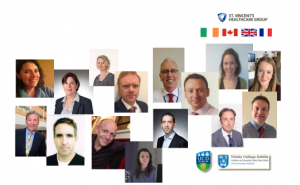28th February 2023

Today is Rare Disease Day.
SVUH is a designated Health Service Executive National Cancer Control Programme (NCCP) National Sarcoma MDT.
Sarcoma represents 1% of all adult and 7-10% of childhood cancers and can affect any part of the body. Broadly speaking it is divided into 2 groups – Soft Tissue and Bone Sarcoma.
In Ireland, there are approximately 300 cases per annum. Sarcoma can affect males and females equally. The cause is unknown in most cases and although any age may be affected the average at diagnosis is between 50-60 years.
“When you mention the word cancer, most people think of more common cancers such as breast, lung and prostate cancer,” said Dr Mark Doherty, Sarcoma Medical Oncologist at SVUH. “Sarcoma is a type of cancer few have heard of, unfortunately people only really hear about it when it touches their life or their family.
Awareness Days are of great importance to help build public health awareness. Today we want to raise awareness for Sarcoma, which is often referred to as the ‘forgotten’ or ‘lonely’ cancer as it is one of the more rare forms. Early detection and diagnosis is key. If you have an unusual lump or bump in the arm, leg or back (in particular) and especially if it measures more than the size of a golf ball and is growing, please don’t ignore it, visit your GP.”
The impact of a sarcoma diagnosis to a patient and their loved one’s can be challenging. Most patients will only require surgery but others require a combination of surgery, radiotherapy and/or chemotherapy. Treatment can last several months and the surgery may affect a person’s mobility and quality of life. Women of child-bearing age might lose their ability to conceive.
Because of its rarity, the best outcomes involve specialist multi-disciplinary teams with access to diagnostics and survivorship programmes. SVUH hosts a National specialist group of clinicians, nurses & supporting professionals who work collaboratively to treat and care for people with sarcoma.
Treatment modalities in Dublin are administered across four main centers, including SVUH, National Orthopaedic Hospital Cappagh, St Luke’s General Hospital, Rathgar and Tallaght University Hospital.
Here in SVUH, the St Anne’s Oncology Unit provides the majority of in-patient chemotherapy based regimens administered by dedicated oncology trained nurses led by Dr Mark Doherty, Sarcoma Medical Oncologist who works closely alongside Ms Hazel Murray, Sarcoma Advanced Nurse Practitioner and Ms Áine Sheridan, Sarcoma Clinical Nurse Specialist. A host of other services are offered including; medical social work, psycho-oncology, dietetics, physiotherapy, occupational therapy, palliative care, psychiatry. SVUH also has an Irish Cancer Society Daffodil Centre; a free, walk-in service where experienced cancer nurses and specially trained volunteers are on hand to provide face to face advice, help and support to anyone affected by cancer. Patients and visitors can drop in at any time during opening hours – no appointment or referral is needed.
SVUH has one of the largest clinical trials units in oncology in Ireland with a National Outreach. Its department has a strong academic background and are actively engaged with University College Dublin and Royal College of Surgeons in Ireland. It also collaborates with scientists and clinicians nationally and internationally related to sarcoma care.
Join us today in shining a light on rare diseases like sarcoma and #lightupforrare #ShowYourStripes
Sarcoma Cancer Ireland #SLRON #CUH #ISG #raredisease
Patient and Visitor Handbook
Our handbook contains all the important information you need when visiting our hospital whether you are a patient or a visitor.
- Travelling to and from the hospital
- Elective admission information
- Emergency Department attendance
- Patient safety information
- Information on what we will do to get you home
- Data protection
- Security information
- Infection control policy
- No smoking policy
- Visiting arrangements
- Daffodil Centre
- St. Vincent’s Foundation